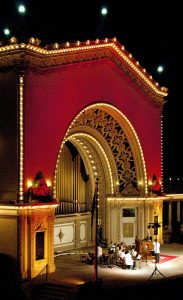Spreckels Summer Organ Festival Opens

Photo: Robert Lang
If last week gave us the summer solstice, then it must be time for San Diego’s summer musical rituals to begin. Monday (June 25) at the Speckels Organ Pavilion in Balboa Park, organist Robert Plimpton and conductor Shannon Kitelinger inaugurated the 25th annual International Summer Organ Festival with a rousing concert of organ, brass, and percussion.
In most church settings, the sonic volume of six skilled brass players will easily balance a pipe organ, but the mighty Spreckels Organ—with with 73 ranks of pipes designed to fill the spacious open-air pavilion—overpowered this ensemble much of the time. Kitelinger, who is Director of Bands at San Diego State University, really needed the university’s entire Symphonic Band to compete with Plimpton’s mightly machine.
Nevertheless, the assembled brass and percussion added a vivid immediacy to the organ’s blast, and we were able to enjoy a couple of rare specimens from the repertory, notably Robert Elmore’s 1964 “Concerto for Organ, Brass and Percussion” and Marcel Dupré’s earlier (1935) “Poème Héroique.”
Plimpton, a confident virtuoso who holds the title of Civic Organist Emeritus, was a protégé of Elmore and brings unmistakable ardor and finesse to this lesser-known American composer’s extroverted style. In his verbal program notes, Plimpton called Elmore’s style “kaleidoscopic,” which is arguably kinder than “unpredictably eclectic,” but both terms apply.
On the other hand, where else might you encounter in a single piece a flashy pedal cadenza with drum accompaniment, variations on a Gregorian chant theme, a bluesy solo for muted trumpet, and a passacaglia that ends with the panache of a rousing musical theater finale? Elmore’s concerto boasts all that and more! Kudos to principal trumpet John Wilds and principal trombone Eric Starr for their suave solos and to conductor Shannon Kitelinger for holding everything together with clear, concise direction.
Dupré’s “Poème Héroique,” a more somber outing for brass and organ, was written as a World War I memorial. Although Dupré was a primarily a concert organist, in this composition his writing for brass proved more varied and deft than that of any others heard on Monday’s program. He was even willing to have the organ serve as mere subdued background to lively counterpoint for trumpet and trombone voices, a welcome contrast to the more typical contest of the two blasting ensembles striving for sonic dominance.
Of the three marches for organ and brass that opened the concert, I thought Sigfrid Karg-Elert’s “Marche Triomphale” took top honors with its nonstop fanfares and unapologetic swagger. So here is where Hollywood’s golden age studio composers purloined all those grand flourishes for opening credits. Charles-Marie Widor’s doleful “Salvum Fac Populum Tuum” was another extended, minor mode funeral march, and Alexandre Guilmant’s “March on a Theme of Handel” sounded dutifully academic, although Plimpton crafted its fugue with a laudable combination of vigor and dignity.
Of his solo organ pieces, Plimpton triumphed in Dupré’s daunting fugue from the familiar “Prelude and Fugue in G Minor,” Op. 7, No. 3, although the equally demanding prelude proved less tamable. Elmore’s dreamy “Night Song” skated at the edge of theater organ indulgence, for which the Spreckels instrument had ample resources to comply.
The Spreckels Organ Society’s summer series continues every Monday evening for the next nine weeks and includes such unusual offerings at the concert organ duo of Elizabeth and Raymond Chenault and theater organist Dennis James accompanying a screening of the Harold Lloyd classic 1924 silent film “Hot Water.” Resident Civic Organist Carol Williams closes the festival on August 27.

Ken Herman, a classically trained pianist and organist, has covered music for the San Diego Union, the Los Angeles Times’ San Diego Edition, and for sandiego.com. He has won numerous awards, including first place for Live Performance and Opera Reviews in the 2017, the 2018, and the 2019 Excellence in Journalism Awards competition held by the San Diego Press Club. A Chicago native, he came to San Diego to pursue a graduate degree and stayed.Read more…
